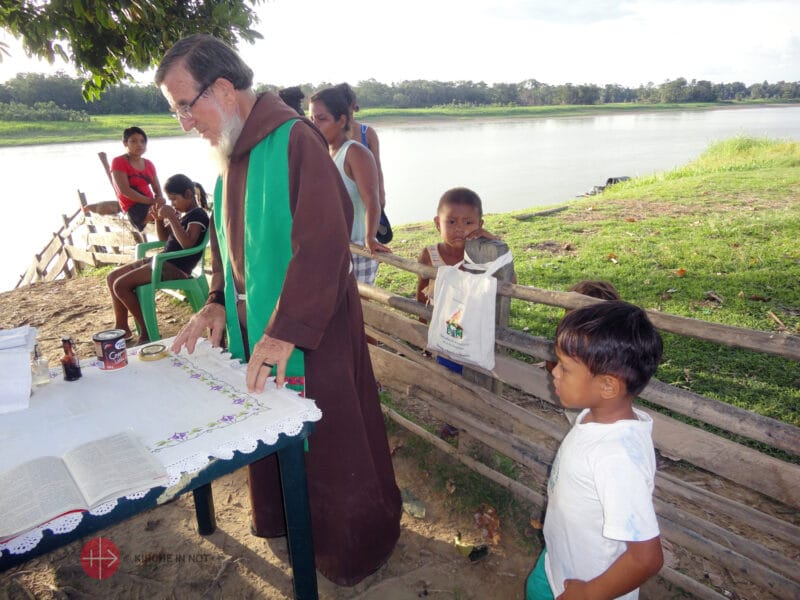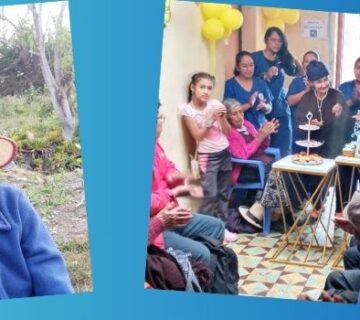An interview with Brother Gino Alberati who has been a missionary in the Amazonian sub-continent since 1970.
Now that the media spotlight upon the green lung of the earth has faded because the forest fires have been extinguished and the Catholic Church’s Synod on the Amazon has produced its final document, we feel it is important to continue to publicise news about the people who live in the Amazon and contribute to its development every day.
There is a great risk that we could regard this piece of land as something from an exotic postcard and very distant from the life of our big cities. It is one of the most extensive multi-cultural workshops on the planet. This aspect of the area certainly makes less of a stir than the environmental issues with which it is associated but respect for this fact is equally central to the survival of its population. For this reason, taking up the cultural challenge in the Amazon and supporting human education and training is of vital importance.

Its population also includes several Focolare communities, families, children and members of religious communities such as Brother Gino, as everyone calls him. Fr. Gino Alberati is an Italian Capuchin missionary who has lived and worked in the Amazon since 1970, serving dozens of communities on the Solimões River, on the Brazilian border with Colombia and Peru. He travels around the area in a boat he received from charity and which he himself maintains. It enables him to celebrate Mass and bring the word of God to communities spread over a vast area; it also allows him to save lives because the nearest doctor is often several days’ travel away.
He is difficult to reach and we could only interview him via Whatsapp. Brother Gino told us about preparing for his missionary work by spending entire days spent at the San Giovanni hospital in Rome. “For nine months I used to visit the laboratories and observed what was happening in operating theatres; I did so to learn something about medicine, because I knew that in the mission for which I was destined there would be no health care facilities and I would have to improvise as a doctor. I was 29 when I arrived in the Amazon and I didn’t care about the distances or the precarious means of transport I used, explained Gino, “my compass was love. In these years I have done just about everything and now I follow a parish that covers a territory 400 km long beside the Amazon and Ica Rivers.”
When we ask him what people live on, he replied that the river is their life. “On the river they travel and fish and the water fertilizes the lower lands. Currently, I follow 40 communities in addition to the parish in the city of Santo Antonio do Içà. I am also the councillor for public health in the town. I report on the heath needs of the communities I visit to the municipal council.
We have not experienced the drama of the fires close up because, in this area, we are far from the places of great interest; nevertheless, the decrease in the forest area is there for all to see. The population also includes Indians from the Ticunas ethnic group; there are about 45,000 of them and they live on agriculture, hunting and fishing. We work hard to give them a basic human, cultural and spiritual education. We have recently given Children’s Bibles in the Ticuna language to 200 leaders from 24 different communities. “
Brother Gino insisted on the fundamental role of the Indians in the conservation of the planet: “Many efforts have been made to combat the risk of pollution, such as the use of hydrogen engines for transport, but, despite this, many of the “great” people in the world see only the ‘god of money’ and want to take the lands away from the natives to extract minerals and oil. The lifestyle of the Indians follows the rhythm of nature; they take from the earth only the essentials, they work small plots of land and for this they do not need large deforestation.”
When we asked him what is the most precious thing that the men and women in the Amazon need apart from having their material needs satisfied, he replied that it certainly is love, “the mutual love that leads to brotherhood”, capable of transforming people and territories everywhere.
Stefania Tanesini


 Italiano
Italiano Español
Español Français
Français Português
Português




No comment